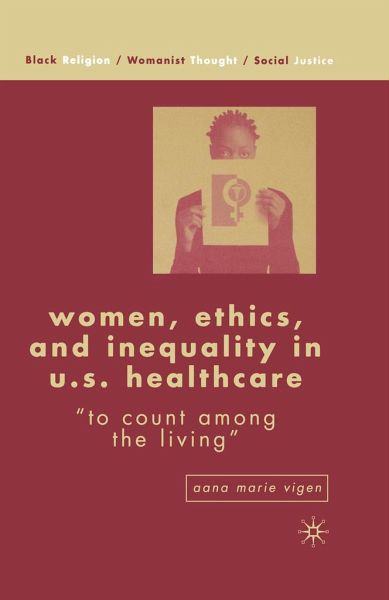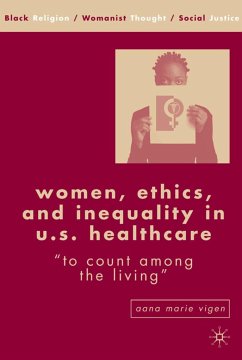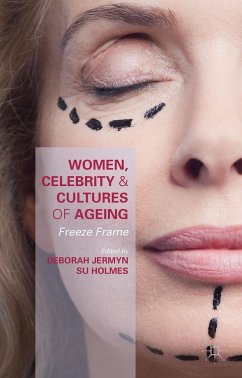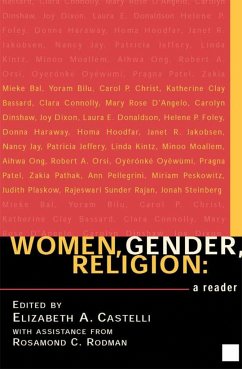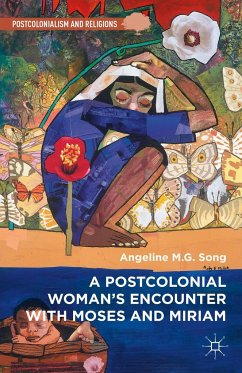'Listening is an art. Hearing is an act of justice-making. Aana Marie Vigen does both as she opens up the world of Black women and Latinas fighting for their lives and their dignity when seeking treatment for breast cancer in a healthcare delivery system riddled with disparities from access to treatment. More than a study in medical ethics, this is a work of passionate concern that all of us count among the living.' - Emilie M. Townes, Andrew W. Mellon Professor of African American Religion and Theology, Yale University Divinity School
'Aana Marie Vigen has written an extraordinary book, bringing together the disciplines of medical sociology, ethnography, and theology. By careful analysis she displays the inequities in healthcare
in the United States related to gender and class. By telling the stories of African American and Latina women living with cancer, she displays their courage and dignity. By attention to feminist and womanist theology and to the theology of the women whose stories she tells she displays the contributions of theology to the ethics of healthcare. I am humbled by this book, humbled by the strength of these women in the face of physical adversity and social injustice, humbled by their theological wisdom and virtue, and humbled by the author who grew both wise and passionate by attentively listening to them. All who hold privilege and power should listen as carefully to those who live at the margins of healthcare in this country. Anyone who is concerned about healthcare in this country should read this book, and anyone who is not concerned about healthcare in this country should have it assigned.' - Allen Verhey, Professor of Christian Ethics, Duke Divinity School, Duke University
'We have a consensus: healthcare is sick and broken. How to heal and fix it eludes us, however. A place to start is by listening to women of color who have cancer as if their voices really mattered. Aana Marie Vigen has. The results? Dispiriting,riveting, unsettling, inspiring. But most of all instructive, instructive for those giving healthcare, those receiving it, and those who worry over its indignities and injustice. How 'to count among the living' and how to begin to repair the breach is what Vigen rigorously engages and offers.' - Larry L. Rasmussen, Reinhold Niebuhr Professor Emeritus of Social Ethics, Union Theological Seminary
'What really matters to Vigen is to understand health disparities not only as statistical differences in health outcomes, but as moral issues in the actual lives of poor women, especially poor Black and Latina women. And these vital issues turn on religious experience and understandings to such a degree that Vigen argues for a theological ethnography a highly original method of studying the intersection of health and religion as lived experience. Vigen listens intensively to what her informants have to say about life, and through her we hear what poverty, illness, discrimination, and social injustice do to women, and how women respond through religious and moral practices. Vigen practices an ethics of engaged advocacy and practical solidarity that itself is arresting and powerful.' - Arthur Kleinman, Esther and Sidney Rabb Professor of Anthropology, Chair, Department of Anthropology, Harvard University, Professor of Medical Anthropology, and Professor of Psychiatry, Harvard Medical School
'Beginning from the well-known realities of health-care discrimination against people 'of color,' Vigen shows how subtle and overt assumptions of white supremacy infect even the most well-intentioned care providers and theorists. This well-documented and innovative work creatively bridges 'mainstream' bioethics and womanist theology. Vigen provides a compelling and effective reeducation for white theologians who think we are already promoting healthcare justice.' - Lisa Sowle Cahill, Monan Professor of Theology, Boston College
'This book speaks to what we all know but seldom address: that healthcare in the United States is racially biased and that this bias works to our detriment both physically and spiritually. Vigen melds hard facts about racial inequalities in healthcare with easy to understand theological affirmations. She uses in-depth interviews to make the facts come alive. She does not shy away from strong critiques of both traditional and feminist views. Best of all, she offers solutions. It is heartening to know that even within an unjust system, individual actions can make a difference. It is helpful to hear from the stories of women with breast cancer what strengthened their resolve and what made them feel respected. This is a book for anyone who cares about justice in healthcare, about why spirituality matters, and about the future of race relationsin America.' - Karen Lebacqz, Professor Emerita, Graduate Theological Union, Pacific School of Religion
'Aana Marie Vigen joins medical sociology, ethnography, and theology to provide not only a critical and incisive analysis of the political, economic, and societal forces that generate gross disparities in healthcare, but also opens a space for the voices of Latina and Black women who suffer from breast cancer. This work not only has implications for healthcare policy, it offers physicians, healthcare providers and healthcare system professionals an opportunity to rethink the quality of healthcare from the bottom up.' - M. Shawn Copeland, Associate Professor of Systematic Theology, Department of Theology, Boston College
'By adding the voices of Black and Latina women with breast cancer to ethics and policy discussions, Aana Vigen has enriched our understanding of the problem of health disparities in the U.S. The women's candid and revealing observations, as well as those of health care providers, provide often provocative, sometimes surprising, and always compelling insights into the way unfounded assumptions and past experiences enter the health care arena. The ethnographic narratives, framed by discussions of social ethics and theology, remind us of the value of listening attentively to the people who struggle not only with disease but also with inequities in health care.' - Carol Levine, Director of the Families and Health Care Project, United Hospital Fund
